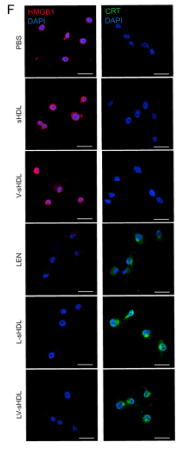CALR Antibody - #DF3139
| Product: | CALR Antibody |
| Catalog: | DF3139 |
| Description: | Rabbit polyclonal antibody to CALR |
| Application: | WB IHC IF/ICC |
| Cited expt.: | WB, IHC, IF/ICC |
| Reactivity: | Human, Mouse, Rat |
| Prediction: | Pig, Zebrafish, Bovine, Horse, Sheep, Rabbit, Xenopus |
| Mol.Wt.: | 62 KD; 48kD(Calculated). |
| Uniprot: | P27797 |
| RRID: | AB_2835516 |
Related Downloads
Protocols
Product Info
*The optimal dilutions should be determined by the end user. For optimal experimental results, antibody reuse is not recommended.
*Tips:
WB: For western blot detection of denatured protein samples. IHC: For immunohistochemical detection of paraffin sections (IHC-p) or frozen sections (IHC-f) of tissue samples. IF/ICC: For immunofluorescence detection of cell samples. ELISA(peptide): For ELISA detection of antigenic peptide.
Cite Format: Affinity Biosciences Cat# DF3139, RRID:AB_2835516.
Fold/Unfold
Autoantigen RO; CALR; CALR protein; CALR_HUMAN; Calregulin; Calreticulin; cC1qR; CRP55; CRT; CRTC; Endoplasmic reticulum resident protein 60; Epididymis secretory sperm binding protein Li 99n; ERp60; FLJ26680; grp60; HACBP; HEL S 99n; RO; Sicca syndrome antigen A (autoantigen Ro; calreticulin); Sicca syndrome antigen A; SSA;
Immunogens
A synthesized peptide derived from human CALR, corresponding to a region within N-terminal amino acids.
- P27797 CALR_HUMAN:
- Protein BLAST With
- NCBI/
- ExPASy/
- Uniprot
MLLSVPLLLGLLGLAVAEPAVYFKEQFLDGDGWTSRWIESKHKSDFGKFVLSSGKFYGDEEKDKGLQTSQDARFYALSASFEPFSNKGQTLVVQFTVKHEQNIDCGGGYVKLFPNSLDQTDMHGDSEYNIMFGPDICGPGTKKVHVIFNYKGKNVLINKDIRCKDDEFTHLYTLIVRPDNTYEVKIDNSQVESGSLEDDWDFLPPKKIKDPDASKPEDWDERAKIDDPTDSKPEDWDKPEHIPDPDAKKPEDWDEEMDGEWEPPVIQNPEYKGEWKPRQIDNPDYKGTWIHPEIDNPEYSPDPSIYAYDNFGVLGLDLWQVKSGTIFDNFLITNDEAYAEEFGNETWGVTKAAEKQMKDKQDEEQRLKEEEEDKKRKEEEEAEDKEDDEDKDEDEEDEEDKEEDEEEDVPGQAKDEL
Predictions
Score>80(red) has high confidence and is suggested to be used for WB detection. *The prediction model is mainly based on the alignment of immunogen sequences, the results are for reference only, not as the basis of quality assurance.
High(score>80) Medium(80>score>50) Low(score<50) No confidence
Research Backgrounds
Calcium-binding chaperone that promotes folding, oligomeric assembly and quality control in the endoplasmic reticulum (ER) via the calreticulin/calnexin cycle. This lectin interacts transiently with almost all of the monoglucosylated glycoproteins that are synthesized in the ER. Interacts with the DNA-binding domain of NR3C1 and mediates its nuclear export. Involved in maternal gene expression regulation. May participate in oocyte maturation via the regulation of calcium homeostasis (By similarity).
Endoplasmic reticulum lumen. Cytoplasm>Cytosol. Secreted>Extracellular space>Extracellular matrix. Cell surface. Sarcoplasmic reticulum lumen.
Note: Also found in cell surface (T cells), cytosol and extracellular matrix (PubMed:10358038). Associated with the lytic granules in the cytolytic T-lymphocytes.
Can be divided into a N-terminal globular domain, a proline-rich P-domain forming an elongated arm-like structure and a C-terminal acidic domain. The P-domain binds one molecule of calcium with high affinity, whereas the acidic C-domain binds multiple calcium ions with low affinity.
The interaction with glycans occurs through a binding site in the globular lectin domain.
The zinc binding sites are localized to the N-domain.
Associates with PDIA3 through the tip of the extended arm formed by the P-domain.
Belongs to the calreticulin family.
Research Fields
· Cellular Processes > Transport and catabolism > Phagosome. (View pathway)
· Genetic Information Processing > Folding, sorting and degradation > Protein processing in endoplasmic reticulum. (View pathway)
· Human Diseases > Infectious diseases: Parasitic > Chagas disease (American trypanosomiasis).
· Human Diseases > Infectious diseases: Viral > HTLV-I infection.
· Organismal Systems > Immune system > Antigen processing and presentation. (View pathway)
References
Application: IF/ICC Species: Mouse Sample: 4T1 cells
Application: IF/ICC Species: Mouse Sample: 4T1 cells
Application: WB Species: Mouse Sample: LLC cells
Application: IHC Species: Mouse Sample: LLC cells
Application: IF/ICC Species: Mouse Sample:
Restrictive clause
Affinity Biosciences tests all products strictly. Citations are provided as a resource for additional applications that have not been validated by Affinity Biosciences. Please choose the appropriate format for each application and consult Materials and Methods sections for additional details about the use of any product in these publications.
For Research Use Only.
Not for use in diagnostic or therapeutic procedures. Not for resale. Not for distribution without written consent. Affinity Biosciences will not be held responsible for patent infringement or other violations that may occur with the use of our products. Affinity Biosciences, Affinity Biosciences Logo and all other trademarks are the property of Affinity Biosciences LTD.









